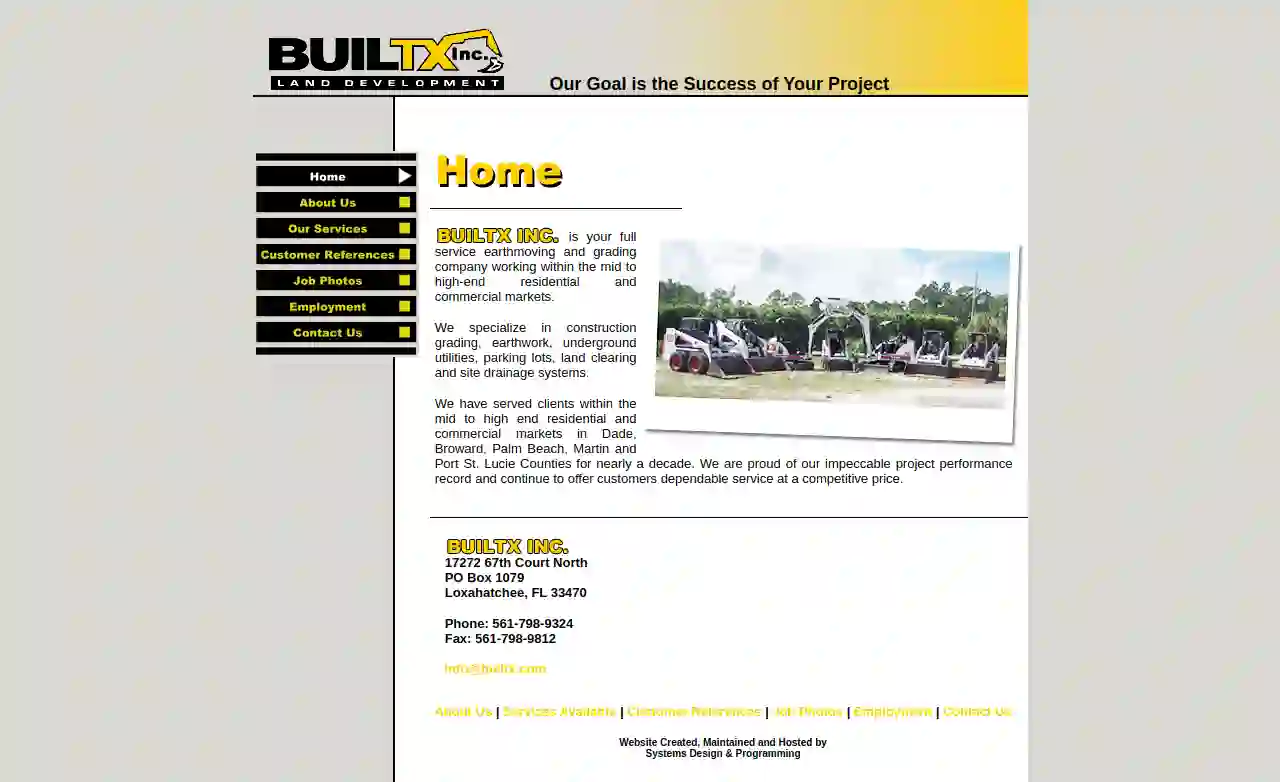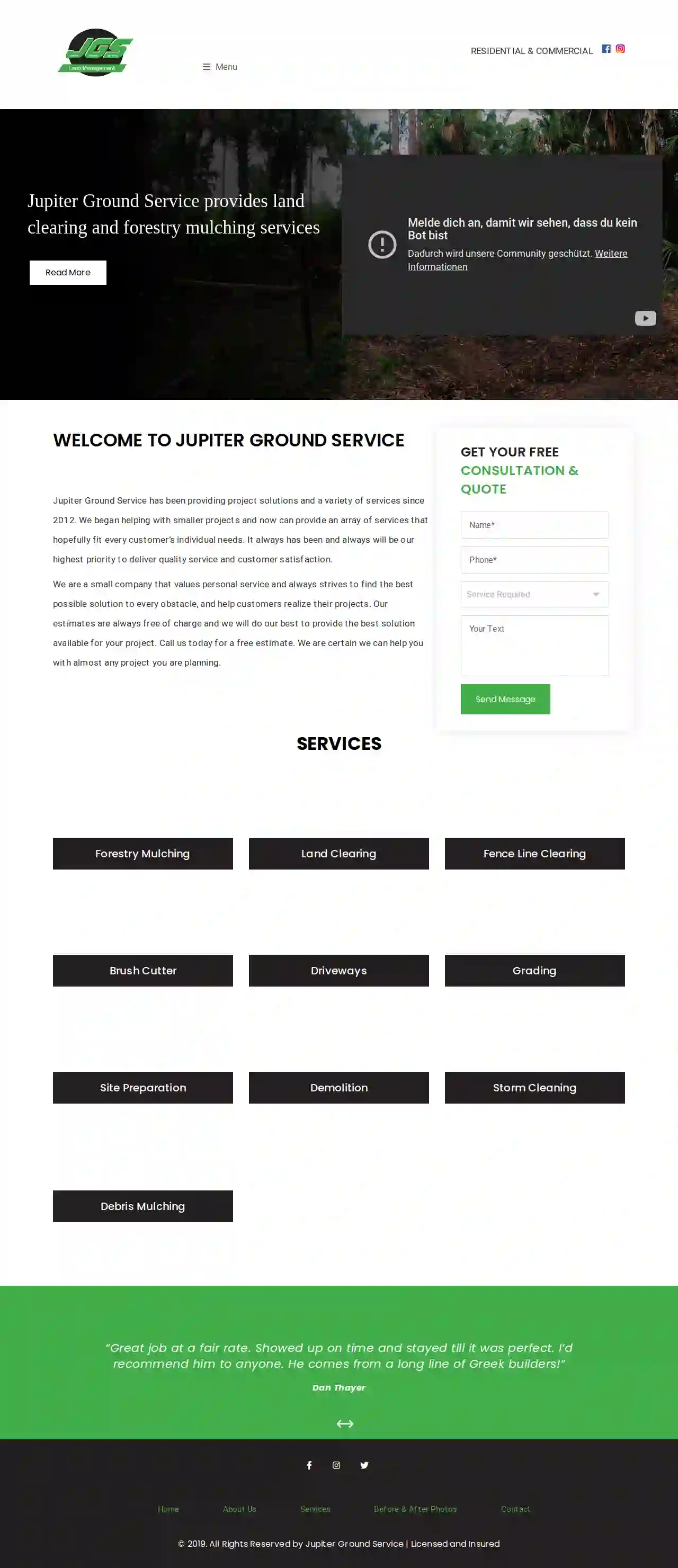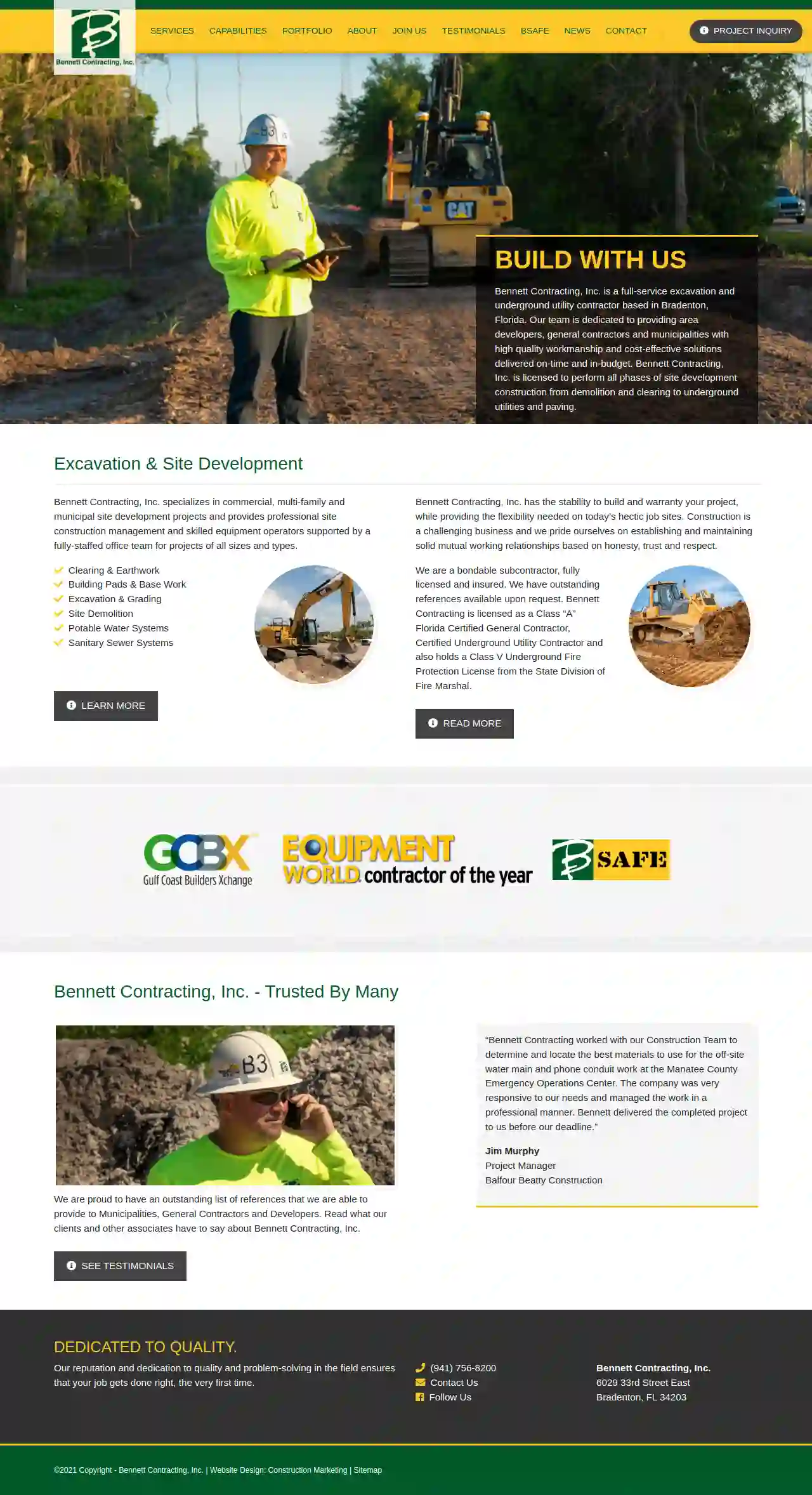Excavation Contractors Palm Springs North
Best Excavation Contractors in Palm Springs North
Get up to 3 Excavation Contractor quotes for your project today! Compare profiles, reviews, accreditations, portfolio, etc... and choose the best deal.

Dirty South Land Management
Robertsdale, USDirty South Land Management Based in Robertsdale, AL, Dirty South Land Management offers professional land clearing services in the surrounding areas with expertise in clearing, grading, and site preparation projects. About Us At Dirty South Land Management, we are a team of experienced professionals dedicated to providing top-notch land clearing services in Robertsdale, AL and surrounding areas. With our specialized equipment and expertise, we tackle projects big and small with precision and efficiency. Trust us to transform your property into a clean slate for future developments.
- Services
- Why Us?
- Testimonials
- Gallery
Get Quote
Builtx Inc
32 reviews17272 67th Court North, PO Box 1079, Loxahatchee, 33470, USBuiltX: Your Partner for Successful Projects BuiltX is a full-service earthmoving and grading company serving the mid to high-end residential and commercial markets. We specialize in construction grading, earthwork, underground utilities, parking lots, land clearing, and site drainage systems. We have a proven track record of excellence, consistently exceeding client expectations. Our commitment to teamwork, pride in workmanship, prompt service, and safety has earned us the respect of our clients. We are proud of our impeccable project performance record and continue to offer customers dependable service at a competitive price. Our knowledgeable management team represents a diverse range of experience in the construction industry. We excel by implementing proven technologies and innovative practical solutions to complete even the most demanding projects. We have a team of skilled workers who are available to assist you throughout all phases of your project. Our reliability of providing outstanding service and consistency in the quality of production has been the driving force behind our extraordinary growth and estimable reputation. Whether a contract is privately negotiated or publicly bid, the success of a project relies on each phase being completed on time and within budget. Let BuiltX provide you with the solutions necessary for your success.
- Services
- Why Us?
- Gallery
Get Quote
Landworx Excavating and Trucking
51 reviewsRobertsdale, AL, 36567, USAbout Landworx Excavating and Trucking Landworx Excavating and Trucking, based out of Robertsdale, Alabama, is a leading provider of excavation and trucking services in the region. With a commitment to excellence, we specialize in site preparation, land clearing, grading, and reliable material transportation for residential, commercial, and industrial projects. Our team of skilled professionals uses state-of-the-art equipment to ensure every job is completed efficiently and safely. Choose us for all your excavation and trucking needs in Robertsdale and the surrounding areas. Contact us today to discuss your project requirements. We pride ourselves on delivering exceptional customer service and high-quality results, making us the trusted choice to meet your needs!
- Services
- Why Us?
- Gallery
Get Quote
Jupiter Ground Service LLC
4.912 reviewsPort St. Lucie, USWelcome to Jupiter Ground Service Jupiter Ground Service has been providing project solutions and a variety of services since 2012. We began helping with smaller projects and now can provide an array of services that hopefully fit every customer’s individual needs. It always has been and always will be our highest priority to deliver quality service and customer satisfaction. We are a small company that values personal service and always strives to find the best possible solution to every obstacle, and help customers realize their projects. Our estimates are always free of charge and we will do our best to provide the best solution available for your project. Call us today for a free estimate. We are certain we can help you with almost any project you are planning.
- Services
- Why Us?
- Testimonials
- Gallery
Get Quote
Castlerock Sitework, Inc.
2930 SE 3rd CT., Ocala, 34471, USAbout Castlerock Sitework Castlerock Sitework, a family-owned and operated business, has been serving the Ocala area for over 25 years. Founded by Wayne Oehlerking, the company began as a general contracting firm specializing in residential homes. Under the leadership of Michael Oehlerking, Wayne's son, Castlerock transformed into a premier complete site development company. Michael, armed with a degree in civil engineering and a general contractor's license, brought a new level of expertise to the company. The tradition of excellence continued with Scott Oehlerking, Michael's son, who joined the company in 2010 and stepped up as vice president in 2013 after earning his business degree from UCF and completing his contractor's license. Today, Castlerock Sitework stands as a testament to over four decades of combined industry experience, boasting a large team of civil engineers and a remarkable portfolio of over 400 projects, contributing to more than $80 million in project revenue. Why Choose Castlerock Sitework? Castlerock Sitework is a reputable construction company with a proven track record of delivering high-quality projects on time and within budget. We offer a wide range of heavy machinery featuring cutting-edge technology such as GPS, along with a field team of expert civil engineers. Our comprehensive site development service simplifies your construction process, providing a one-stop solution for seamless project execution. From surveying and land clearing to asphalt and concrete paving, our expert team handles every detail, ensuring efficiency, cost-effectiveness, and a high standard of quality. Avoid the complications of dealing with multiple subcontractors and enjoy peace of mind with our integrated approach, which guarantees compliance and structural integrity. With Castlerock, you're laying the foundation for lasting success, allowing you to focus on your vision with confidence.
- Services
- Why Us?
- Our Team
- Gallery
Get Quote
Bennett Contracting Inc
54 reviews6029 33rd Street East, Bradenton, 34203, USBuild With Us Bennett Contracting, Inc. is a full-service excavation and underground utility contractor based in Bradenton, Florida. Our team is dedicated to providing area developers, general contractors and municipalities with high quality workmanship and cost-effective solutions delivered on-time and in-budget. Bennett Contracting, Inc. is licensed to perform all phases of site development construction from demolition and clearing to underground utilities and paving. Excavation & Site Development Bennett Contracting, Inc. specializes in commercial, multi-family and municipal site development projects and provides professional site construction management and skilled equipment operators supported by a fully-staffed office team for projects of all sizes and types. Services Offered Clearing & Earthwork Building Pads & Base Work Excavation & Grading Site Demolition Potable Water Systems Sanitary Sewer Systems Bennett Contracting, Inc. has the stability to build and warranty your project, while providing the flexibility needed on today’s hectic job sites. Construction is a challenging business and we pride ourselves on establishing and maintaining solid mutual working relationships based on honesty, trust and respect. We are a bondable subcontractor, fully licensed and insured. We have outstanding references available upon request. Bennett Contracting is licensed as a Class “A” Florida Certified General Contractor, Certified Underground Utility Contractor and also holds a Class V Underground Fire Protection License from the State Division of Fire Marshal.
- Services
- Why Us?
- Our Team
- Testimonials
- Gallery
Get Quote
Big Yellow Steel
533 reviews2190 NW 7TH AVE., MIAMI, 33127, USAt JMS International Corp and Big Yellow Steel Our hard work is your gain. We are devoted to our job because to us, it’s a lifestyle. We are constantly searching for new ways to improve and expand our business, and we never turn down customer suggestions. Contact us at any time via email with ideas or concerns and we’ll get back to you as soon as possible. The whole purpose of our work at JMS International Corp dba Big Yellow Steel is to make you smile. We are passionate about the work we do and we are constantly looking to exceed your expectations. If you’re ever dissatisfied with our work, we want to know about it.
- Services
- Why Us?
- Our Team
- Gallery
Get Quote
Christopher Construction
4.928 reviewsSarasota, USChristopher Construction is a professional licensed residential contractor Lic# CRC1334699 dedicated to the satisfaction of the client. Our objective is to continue to meet the needs and requirements of discerning clients through our remodeling expertise and specialties, and to keep pace with an evolving and refining remodeling industry. We strive to be equipped to meet the design and construction needs of clients seeking residential additions and alterations to their homes including decks, kitchen & bath remodels, whole house remodels, upgrades and improvements of any type, exterior and interior. Our continued business success and longevity relies on referrals from satisfied clients as we remodel lifestyles through quality home improvements.
- Services
- Why Us?
- Gallery
Get Quote
Pensacola Family Asphalt
53 reviewsPensacola, USAbout Our Company Pensacola Family Asphalt is a locally owned and operated paving company serving all of Pensacola, FL and the surrounding areas. As fully-licensed paving contractors, we take pride in the work that we do. We have over a decade of experience working on various projects and have the know-how to do a great job on your next paving project. With our expertise, high quality materials, and heavy duty equipment, you can be assured your project will turn out exactly as you envision. Top Rated Contractors We have been serving customers with our paving expertise for many years and have established ourselves as a trustworthy and reliable company. Our paving contractors take pride in their work, and make sure to do every step of the process well. From solid foundations, to quality blacktop, to cleaning up after ourselves, our care and attention to detail is evident. We Work On All Kinds of Projects Asphalt has been in use for hundreds of years, and is used on all kinds of properties, for a variety of applications. As a top asphalt paving company in the area, we work on both residential and commercial projects. Whether you have a small driveway, or a large mall parking lot, we can help! Our paving crews work on new construction projects, mill and overlays, as well as routine maintenance. Fully Equipped Asphalt paving requires specialized equipment, and we use quality heavy-duty equipment that will lend great results for your paving projects. Proper asphalt paving also requires hands-on experience. With our many years in the asphalt industry, you can be sure we don’t skip steps or cut corners. Our paving contractors have an eye for detail, extensive knowledge, and decades of experience. Free Estimates If you’re ready to start a new project, give us a call for a free estimate. We provide free quotes, assessments, and advice. Whether you have a question on sealcoating your parking lot, repairing a driveway apron, or want us to submit a bid, give us a call or email us. We’ll be happy to work up an estimate and look forward to helping with all your paving needs.
- Services
- Why Us?
- Testimonials
- Gallery
Get Quote
Blue Reef LLC
Ocala, USWhy Choose Blue Reef? We offer an end-to-end client experience that includes seamless communication, budgeting, staffing, on-site organization, and solid, quality craftsmanship every time. Our past projects include both new construction and repairs/restorations. Occupied and fully operational job sites are never a problem. We also plan, manage, and build multi-phase projects. Our team works with clients and designers to produce work we think you'll love. Call us today and bring our project management skills and extensive construction management experience to your next project. About Blue Reef Dedicated to Florida Blue Reef LLC was founded in Ocala Florida in 2006. Since then, we have been specializing in commercial buildouts, remodels, and new construction of office, retail, or medical projects. Having completed projects in Jacksonville, Gainesville, Ocala, Belleview, Tampa, Brooksville, The Villages, Orlando, Sanford, Cocoa, Bradenton, Sarasota, Fort Pierce, Lake Worth, and more, we are truly dedicated to the state, concentrating our efforts right here in Central Florida. It's In Our Blood Brothers Mark and Paul Rakes strive for excellence, and client satisfaction. Having grown up with a father in construction, and over 35 years of professional construction experience, we truly have a lifetime dedication to the craft. "We believe in a level of communication and professional courtesy not often found in today’s construction industry". Why Wait? With our experience, local dedication, and low overhead, Blue Reef is the answer to all your commercial construction needs. We are a fully licensed and insured State Certified Building Contractor CBC1257338, so you have peace of mind that you are getting the quality experience that your business deserves. We understand what it means to take pride in our work, and would love to work with you on your next project.
- Services
- Why Us?
- Our Team
- Gallery
Get Quote
Over 22,076+ Excavation Pros onboarded
Our excavation experts operate in Palm Springs North & surrounding areas!
ExcavationHQ has curated and vetted Top Excavation Pros arround Palm Springs North. Find a top & trustworthy contractor today.
Frequently Asked Questions About Excavation Contractors
- Project Type and Size: Ensure the contractor has experience handling projects similar to yours in scale and complexity.
- Reputation and Reviews: Check online reviews and testimonials, and request references from previous clients.
- Licensing and Insurance: Verify that the contractor is properly licensed and insured to protect you from liability.
- Equipment and Resources: Confirm that they have the necessary equipment and resources for your project's needs.
- Communication and Transparency: Choose a contractor who communicates clearly, provides detailed estimates, and keeps you informed throughout the project.
- Safety Record: Inquire about their safety protocols and track record to ensure a safe work environment.
- Price: While price is important, it shouldn't be the only deciding factor. Balance affordability with experience, reputation, and quality of service.
- Soil Type and Stability: Stable, cohesive soils allow for deeper excavations than loose or unstable soils.
- Groundwater Level: Excavations below the water table require dewatering techniques to manage water intrusion.
- Equipment and Resources: The size and capabilities of excavation equipment influence the achievable depth.
- Safety Regulations: OSHA and other safety regulations impose limitations on trench depths without proper shoring or sloping.
- Project Requirements: The purpose of the excavation (basement, pool, foundation) determines the necessary depth.
- Determining Soil Suitability: Assessing whether the soil can support the intended structure or load.
- Recommending Foundation Types: Advising on the appropriate foundation design based on soil characteristics.
- Addressing Drainage and Erosion Issues: Providing solutions to manage water runoff and prevent erosion.
- Evaluating Slope Stability: Assessing the risk of landslides or soil movement on slopes.
- Building on challenging soil types (expansive clay, loose sand, etc.)
- Constructing large or complex structures
- Excavating near slopes or retaining walls
- Addressing drainage or erosion concerns
- Mechanical Excavation: Utilizing heavy equipment like excavators, backhoes, bulldozers, and loaders, suitable for most projects.
- Hand Excavation: Using hand tools (shovels, picks) for smaller excavations or delicate work near utilities.
- Blasting: Employing explosives to break up rock or hard materials, typically for large-scale projects.
- Hydro Excavation: Using high-pressure water jets to loosen and remove soil, often used for locating utilities or delicate excavation.
- Vacuum Excavation: Employing a vacuum system to suck up excavated material, suitable for safe excavation near utilities or in confined spaces.
How do I choose the right excavation contractor for my project?
How deep can you excavate?
What is a soil engineer, and do I need one?
What are the different methods of excavation?
How do I choose the right excavation contractor for my project?
- Project Type and Size: Ensure the contractor has experience handling projects similar to yours in scale and complexity.
- Reputation and Reviews: Check online reviews and testimonials, and request references from previous clients.
- Licensing and Insurance: Verify that the contractor is properly licensed and insured to protect you from liability.
- Equipment and Resources: Confirm that they have the necessary equipment and resources for your project's needs.
- Communication and Transparency: Choose a contractor who communicates clearly, provides detailed estimates, and keeps you informed throughout the project.
- Safety Record: Inquire about their safety protocols and track record to ensure a safe work environment.
- Price: While price is important, it shouldn't be the only deciding factor. Balance affordability with experience, reputation, and quality of service.
How deep can you excavate?
- Soil Type and Stability: Stable, cohesive soils allow for deeper excavations than loose or unstable soils.
- Groundwater Level: Excavations below the water table require dewatering techniques to manage water intrusion.
- Equipment and Resources: The size and capabilities of excavation equipment influence the achievable depth.
- Safety Regulations: OSHA and other safety regulations impose limitations on trench depths without proper shoring or sloping.
- Project Requirements: The purpose of the excavation (basement, pool, foundation) determines the necessary depth.
What is a soil engineer, and do I need one?
- Determining Soil Suitability: Assessing whether the soil can support the intended structure or load.
- Recommending Foundation Types: Advising on the appropriate foundation design based on soil characteristics.
- Addressing Drainage and Erosion Issues: Providing solutions to manage water runoff and prevent erosion.
- Evaluating Slope Stability: Assessing the risk of landslides or soil movement on slopes.
- Building on challenging soil types (expansive clay, loose sand, etc.)
- Constructing large or complex structures
- Excavating near slopes or retaining walls
- Addressing drainage or erosion concerns
What are the different methods of excavation?
- Mechanical Excavation: Utilizing heavy equipment like excavators, backhoes, bulldozers, and loaders, suitable for most projects.
- Hand Excavation: Using hand tools (shovels, picks) for smaller excavations or delicate work near utilities.
- Blasting: Employing explosives to break up rock or hard materials, typically for large-scale projects.
- Hydro Excavation: Using high-pressure water jets to loosen and remove soil, often used for locating utilities or delicate excavation.
- Vacuum Excavation: Employing a vacuum system to suck up excavated material, suitable for safe excavation near utilities or in confined spaces.